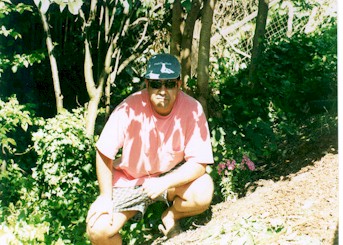Freedom Song
In the words of Catherine Masud, half of the duo who created Muktir Gaan (above) from Lear Levin's footage:
Tareque and I had been in the U.S. for almost one year. We didn’t really have any particular plan in mind at the time for staying in the States. Rather, it was a ‘decompression’ of sorts, after a hectic period in Bangladesh and India when we had to undergo enormous struggle to complete ‘The Inner Strength’, Tareque’s documentary film on the life and art of the painter S.M. Sultan. In New York, Tareque was working in a famous used bookstore called the Strand, and amassing an enormous collection of books on film and Indology in the process. I was an executive in an advertising agency, halfheartedly climbing the corporate ladder. We were both looking for something inspiring to throw ourselves into, but weren’t quite sure how and where to start.
At that time, we were spending almost every weekend with my brother Alfred, who was completing his postdoctoral work in physics in Princeton, New Jersey. One day Tariq Ali, an old friend of Tareque’s cousin Benu, stopped by. He was in the neighboring town of Lawrenceville, working for a pharmaceutical firm. He invited us to come over for lunch at his place the following weekend. The following Saturday found us sitting cozily in Tariq bhai’s living room, exchanging stories of Dhaka and dreams of return. The conversation drifted to the Liberation War. Tariq bhai and Benu bhai were together at that time, singing in a cultural squad made up of refugee artistes. Tariq bhai recalled that an American film crew had traveled with them for some time, documenting their experiences during the war. Tareque vaguely remembered that in the early 1970’s, Benu bhai had often mentioned this filmmaker in passing during reminiscences of the War. His name, according to Tariq bhai, was Lear Levin. We were immediately intrigued. What an unusual name: Lear. It conjured up images of grandeur and tragedy. What had become of his footage? Perhaps it was a journalistic catalog of events of the war. Certainly Lear no longer lived in New York. Perhaps he was long since dead.
Over the next week or so, Tareque and I gradually forgot about Lear Levin. But the following Saturday, I was suddenly inspired to pick up the phone book and look through the L’s. And there it was. Lear Levin. And Lear Levin Productions. I am always nervous about phone calls, so I handed the phone to Tareque. He called the production office—it was the weekend, but he could leave a message. But someone picked up the phone.
Tareque: Yes, I was trying to reach a Mr. Lear Levin.
Lear: This is Lear Levin.
Tareque: Oh...were you by any chance in Bangladesh in 1971?
Lear: Yes.
Tareque: You did some shooting then?
Lear: Yes.
Tareque: Well, I wanted to talk to you because I’m also from Bangladesh, I’m a filmmaker, my name is Tareque Masud.
Lear: Ah. Well, in 1971 I was a young man, thirty years old. I went to Bangladesh to make a film about the Liberation War. I put a lot of myself into that film, a lot of money and time, but eventually I had to abandon the project. And now, you have called. I think I have been waiting nineteen years for this call.
(Extended quote borrowed from newagebd.com. Read the rest of her recollection here.)


0 Comments:
Post a Comment
<< Home